All the below links are in English.
以下弊社ページ(全て英語)は、標記につき取り急ぎ関係記事の一部を抜粋したものです。
各回、複数の分類に入り得る記事があります。
今後も、原則として、弊社英語サイトにて動向を追う等して参ります。
英語圏政治経済情報
All the below links are in English.
以下弊社ページ(全て英語)は、標記につき取り急ぎ関係記事の一部を抜粋したものです。
各回、複数の分類に入り得る記事があります。
今後も、原則として、弊社英語サイトにて動向を追う等して参ります。
(All the below links are in English.)
日本時間9日午後3時(アメリカ東部標準時9日午前1時 1am 11/9 EST)少し前の時点で開票が終了しておらず優勢陣営の勝利宣言もまだ確認できていませんし、何処かで票の数え直し等起こるのかもしれませんが、このまま行けば、アメリカ大統領選挙はドナルド・トランプ共和党大統領候補の当選に終わりそうです。何度目かの揺れ戻しが再び投票終了までにあったのか、隠れトランプ支持や世間の予定調和的発想の多さなども含めてそもそも世論調査等が的を得ていないのか(参照:worldsolutions.work “US Presidential Election 2016 Vol.7 (polls up to early morning 11/7)”)、今後議論されるでしょうが、選挙ですから毎度何が起きるか分かりません。
部外者かつ外国人が言うのは求められていませんが敢えて言うなら、クリントン候補はよく頑張ったと感じています。病に倒れた後である、民主党政権8年の後である、夫が既に8年間大統領を務めた後である、教育機関とは逆に政界での女性の立場はアメリカでは強くない、SNS等により国民の世俗化が進む中でエリート過ぎる、真偽を問わずスタッフ等に関する様々なスキャンダルがあった、などでしょうか。
なお、連邦上院及び下院でもそれぞれ共和党が過半数を取りそうです。
アメリカでは内閣総辞職や解散総選挙が無いので、まずは4年間このトランプ共和党新政権が続きます。日米同盟の下、我が国は新政権と上手く付き合っていくことになります。
もちろん政権の今後を正確に見通せる人は存在しませんし、大統領選挙中のトランプ新大統領(2017年1月20日、就任式・政権発足予定)の発言や政策は細部不透明なものが少なくなかったため主張していた政策が今後変わり得ますが、少なくとも US Presidential Election 2016 Vol.3 (Mr. Donald Trump’s policies) から今後の政策変更を感じることはできます。
日本にとって緊喫の課題となるTPPや在日米軍については今後の様々な動きを注視するとして、
環境規制も含めた経済コストを上げてしまっている規制を撤廃する規制政策(Regulations Read Donald J. Trump’s Plan To Put an End to Burdensome Regulations は無くなっているので今後新たに発表されるのでしょう)、
合法移民の経済状態を守りつつアメリカ国民の雇用等を優先し不法移民を取り締まる移民政策(Immigration Read More on Donald J. Trump’s 10 Point Plan to Put America First も無くなっているので今後新たに発表されるのでしょう)、
全国平均で25%も保険料が上がってしまっているオバマケアを廃止し Health Savings Accounts (HSAs) を導入する医療保険政策(Health Care 添付されている HCReformPaper.pdf も要参照)、
清潔な空気や水を維持しながらエネルギー分野での雇用増大などを図るエネルギー政策(Energy Read Donald J. Trump’s 100-Day Action Plan も無くなっているので今後新たに発表されるのでしょう)、
2500万人の雇用を創出する経済政策(Economy Read Donald J. Trump’s Plan to Create 25 Million Jobs も無くなっているので今後新たに発表されるのでしょう)、
と相互に関連する国内経済政策の方針部分を見るだけでも、今後アメリカ国内の政策も雰囲気も変わって行き、日本も含めた対外政策や国際情勢にも当然影響してくるはずです。
日本政府や日本企業、日本国民においても、日々、様々な分析や対応などが必要になります。
(All the below links are in English.)
選挙なので様々ある中でも10/28のFBI捜査再開がクリントン候補への逆風となったものの、不起訴とすることを再捜査により決定した旨の11/6のFBI発表は、大統領選挙については逆風を短期間で収束させつつある、と各種世論調査から読むことはできます(参照:連邦議会上下両院議員選挙及び知事選挙も含めて、worldsolutions.work “US Presidential Election 2016 Vol.7 (polls up to early morning 11/7)”)。
アメリカでも、捜査するしない・起訴するしないが原則検察官等に委ねられているのは、日本の刑事訴訟法189条2項(犯罪があると思料し捜査を開始)・248条(起訴便宜主義)などと大筋同様(例:Information Network for Mutual Assistance in Criminal Matters and Extradition、The Theory Of Prosecutorial Discretion In Federal Law: Origins And Developments (PDF) | Rebecca Krauss (@YaleLawSch) @SetonHallLaw 4頁目)のようですから、新たな証拠が見つかるなど無い限り本件の蒸し返しは今後無い、ということでしょうか。
尤も、11/5までに4000万人を超え既に4年前の前回を上回っている期日前投票、更には連邦議会選挙や知事選挙にも影響は無かったと言い切るのは少なくとも感覚的には難しいでしょう。
その連邦議会上院及び下院の政策関連権限、そしてその権限に基づき今後の政策方向性に大きく作用する上下両院の議席予測につき以下簡単に触れておきます。(アメリカ合衆国憲法条文及び説明については、U.S. Constitution | @LIICornell で検索できます。)
政策方向性を考えると、上院 Senate に特化された権限では、下記が気になります。
○ 条約批准・修正等に係る大統領への出席議員の3分の2による助言と承認(Article II, Section 2, Clause 2, U.S. Constitution “He shall have Power, by and with the Advice and Consent of the Senate, to make Treaties, provided two thirds of the Senators present concur;”)
○ 公務員任命に係る大統領への助言と承認 (Article II, Section 2, Clause 2, U.S. Constitution “and he shall nominate, and by and with the Advice and Consent of the Senate, shall appoint Ambassadors, other public Ministers and Consuls, Judges of the supreme Court, and all other Officers of the United States, whose Appointments are not herein otherwise provided for, and which shall be established by Law: but the Congress may by Law vest the Appointment of such inferior Officers, as they think proper, in the President alone, in the Courts of Law, or in the Heads of Departments.”)
○ フィリバスター宣言による議事停止(Rule XXII, STANDING RULES OF THE SENATE: REVISED TO JANUARY 24, 2013)
今は上記規則上必要無くなった長時間演説は減っているようですが、クルーズ議員のオバマケア反対演説が報道では良くも悪くも大きく取り上げられていました(例. Cruz ends marathon speech | @burgessev @politico)。
他方、下院 House に特化された権限では予算法案の先議権(※ Article I, Section 7, U.S. Constitution)などがありますが、政策方向性を考えるとやはり定数・任期・党派構成などが上院と異なることによる下院の政治動向が気になります。
※
All bills for raising revenue shall originate in the House of Representatives; but the Senate may propose or concur with amendments as on other Bills.
Every bill which shall have passed the House of Representatives and the Senate, shall, before it become a law, be presented to the President of the United States; if he approve he shall sign it, but if not he shall return it, with his objections to that House in which it shall have originated, who shall enter the objections at large on their journal, and proceed to reconsider it. If after such reconsideration two thirds of that House shall agree to pass the bill, it shall be sent, together with the objections, to the other House, by which it shall likewise be reconsidered, and if approved by two thirds of that House, it shall become a law. But in all such cases the votes of both Houses shall be determined by yeas and nays, and the names of the persons voting for and against the bill shall be entered on the journal of each House respectively. If any bill shall not be returned by the President within ten days (Sundays excepted) after it shall have been presented to him, the same shall be a law, in like manner as if he had signed it, unless the Congress by their adjournment prevent its return, in which case it shall not be a law.
Every order, resolution, or vote to which the concurrence of the Senate and House of Representatives may be necessary (except on a question of adjournment) shall be presented to the President of the United States; and before the same shall take effect, shall be approved by him, or being disapproved by him, shall be repassed by two thirds of the Senate and House of Representatives, according to the rules and limitations prescribed in the case of a bill.
選挙の結果予想は、上院については、2016 Senate Election Interactive Map: 34 U.S. Senate seats to be contested in 2016 | @270toWin (@CookPolitical,@LarrySabato,@battleground_16) では、民主党・共和党いずれが過半数を取るかは予測し切れず、また、現職落選(いずれも共和党)はイリノイ・ニューハンプシャー・ペンシルバニア・ウィスコンシンと予測されています。GOP Hopes Rise In Battle For The Senate, But Democrats Still Have The Edge (11/7) | @JessicaTaylor @nprpolitics では、現職或いはその後継者の党議席維持と予測されているミズーリ・ノースカロライナ・インディアナ・ネバダ・フロリダ・アリゾナ・オハイオについても、上記4州に加えて説明があります。
下院は 2016 House Election Interactive Map: All 435 House seats to be contested in 2016 | @270toWin (@CookPolitical,@LarrySabato,@battleground_16) で共和党が過半数を取ると予測されています。
以上、投票直前の東部標準時8日早朝の一応の概観です。最友好国とは言え外国の選挙なので、どの選挙で誰が当選しても今後も関係を深化させて行くのみでしょう。
All the below links are in English.
RESIGNATION LETTERS PILING UP AT FBI: James Comey’s wife urged director to take powerful action | @JoeKovacsNews @worldnetdaily と FBI in Internal Feud Over Hillary Clinton Probe: Laptop may contain thousands of messages sent to or from Mrs. Clinton’s private server | @DevlinBarrett @WSJ を総合すると、
各種選挙全般の結果に影響を与えてしまうのを避けるために捜査をしない旨 7月に James Comey コミーFBI長官が決定していた方針に対して、反対し長官周辺に積み上がる声を、
クリントン民主党大統領候補の国務長官時代のプライベートサーバーを経由した、現在もクリントン陣営スタッフのトップである Huma Abedin 氏とその別居中の夫である性的にスキャンダラスな元連邦下院議員(NY州) Anthony Weiner 氏とのメールが新たに見つかったため長官は抑え切れなくなった、と解されます。
正直、クリントン陣営にとっては何故この投票日10日前というこの時期にと憤慨する以外にないでしょうし、トランプ陣営にとっては同共和党大統領候補の各種言動が長く波紋を広げていたにしても何故最重要と思しき第2回討論会直前に10年以上前の事がなどという台詞が今月7日の @nytimes などの報道に対してあったでしょう。この #OctoberSurprise について関係者以外が何かを言い切るには、もう少し報道を待ちつつまずは事情詳細を正確に知る必要があります。上記以外にも以下、関連ニュースの一部を貼っておきます。なお、コミー長官は、ブッシュJr共和党政権下の2003-05年に司法副長官、オバマ民主党政権下の2013年から現在までFBI長官を務めています。
On Clinton Emails, Did the F.B.I. Director Abuse His Power | Prof Richard W. Painter @UofMNLawSchool @NYTopinion
Time for FBI director Comey to go | @paulcallan @CNNPolitics
For Democrats, Anthony Weiner Makes an Unwelcome Return | @maggieNYT @alexburnsNYT @NYTPolitics
Emails In Anthony Weiner Inquiry Jolt Hillary Clinton’s Campaign | @adamgoldmanNYT @arappeport @NYTPolitics
James Comey: FBI chief at loggerheads with Clinton camp | @BBC
US election: FBI’s Clinton emails move defended by Comey | @BBC
Will Clinton lose the election due to FBI’s email investigation?: Democratic nominee is losing support as Trump is seeing a resurgence | @IrishTimes
US election 2016: FBI chief James Comey ‘may have broken federal law’ | @WSJ @australian
Here’s what we need to know about those emails | @ThePlumLineGS @nzherald
James Comey, FBI director, denies bias to Congress in Clinton email probe: Republicans have criticized both the investigation and the decision not to prosecute | @AP @CBCNews
Here are articles including those concerning the 3rd presidential debate. All the below links are in English.
You can check out the following website for policies: worldsolutions.work
標記第3回(於:@UNLV)などに関する記事を取り急ぎ以下貼っておきます。政策については上記URLをご覧ください。(本投稿一番下に私見を書きました。)
Linguist Geoffrey Nunberg on election language (YouTube) | UC Berkeley School of Information
Post-debate poll: Clinton 49%, Trump 39% (w PDF) | YouGovUS
White House Watch: Down to the Wire? | Rasmussen Reports
How Does the U.S. Stock Market Perform in Election Years? | JEFF DESJARDINS, Visual Capitalist
Presidential Debate: What you missed | Alexander Burns & Matt Flegenheimer, New York Times
Final Presidential Debate: Live Analysis of Clinton vs. Trump | Wall Street Journal
Most Memorable Lines of the 3rd Presidential Debate | ADAM KELSEY, ABC news
Watch: Trump Won’t Commit To Accepting Election Results In Final Debate | JESSICA TAYLOR, NPR
What Went Down In The Third Presidential Debate | FiveThirtyEight
Donald Trump and America’s Incomplete Contract with Itself | Mark Harrison, University of Warwick
Is America collapsing like the Roman Empire? | Barry Strauss, Fox news, CornellCAS
The Axe Files (Podcast): Ep. 88 – Ron Brownstein | David Axelrod, CNN, UChicago Politics
Clinton maintains double-digit (51% vs. 36%) lead over Trump | PRRI/Brookings Survey
Clinton’s Florida Lead Continues to Grow | PublicPolicyPolling
WashU Expert: Losing hurts in partisan politics | Erika Ebsworth-Goold
Covering Immigration and the Election (YouTube) | Stanford CCSRE
Marcus Noland commentary: Trade war would yield Ohio casualties | The Columbus Dispatch, PIIE
The Russian Group Hacking US Elections | Sheera Frenkel, Buzzfeed
THE THIRD PRESIDENTIAL DEBATE: LIVE-DRAWING BY JASON ADAM KATZENSTEIN | The New Yorker
The definitive ranking of presidential (and VP) debate moderators | Carly Mallenbaum, USA Today
A PARLIAMENT OF ELECTION EXPERTS | MICHAEL HARDY, Rice Magazine, Baker Institute
Expert: Rigging the presidential election would be “impossible” | Bailey Harbit, WSAW
私見:10月4日の副大統領候補者テレビ討論会の後、10月7日にトランプ候補の10年以上前の問題発言が公になったのが、大きな分かれ目でしょう。
政治ですから、この時期に公になり火が付いたのは不可思議ということもありません。また、白人既婚女性が対象となるなど限界を超えた感があり、テフロン加工が剥がれたようです。さらに、初の選挙出馬で公職経験も無い挑戦者という立場は、年齢が高くてもフレッシュさは満点で期待を集めますが、強い信頼関係の下で助けてくれる人材が不足し、それを自分の口一つでカバーするというのも限界があります。しかも、その舞台がアメリカ大統領選挙本選という世界最大の選挙ですから、無理なのかもしれません。それでも、既存政治家への不満や不信が国民に渦巻いているとは言え、共和党という二大政党の大統領選挙の予備選挙を勝ち抜いただけでも凄いことではあります。
討論会だけを見ると、多くの勝者投票結果などと異なるかもしれませんが、10月9日の2回目は超逆境ながら何とかやりすごすタフさを見せましたが、1回目は口数も悪態ももう少し大人しくして政策批判や政策主張の中で挑戦者らしく内容や根拠にもっと具体的に踏み込むのが良かったであろうし、3回目の今回は全てに一番新味に欠け全然魅力ある政権を想像させませんでした。他方、クリントン候補は、1回目の特に冒頭は疲れか緊張感があるようにも感じられましたし、2回目も決して楽な感じを受けませんでしたが、相手や場に慣れてくると徐々に底力が出てきたのか、3回目の今回は現職大統領のように全てに強く見えました。
選挙ですから、最後まで予断を許しません。投票により選ばれた大統領が、アメリカ国民に喜ばれつつ日本との一層の関係深化へも進み、両国の共存共栄が深まる、そんな方であることを祈念しております。
Here are a part of articles concerning the presidential election. All the below links are in English.
You can check out the following website for policies: worldsolutions.work.
標記につき関連記事を以下貼っておきます。政策については上記URLをご覧ください。
Lewd Donald Trump Tape Is a Breaking Point for Many in the G.O.P. | @nytimes
Election Update: Women Are Defeating Donald Trump | @NateSilver538
US Election 2016: In Conversation with @EdwardGLuce (w Podcast) | @Jparakilas @ChathamHouse
@ASPI_org suggests | @AmeliaLong222 @davidmlang
Reports of Obamacare’s demise are greatly exaggerated | @crampell @washingtonpost
Putting the Populist Revolt in Its Place | @Joe_Nye @ProSyn
How Trump and Clinton Could Still Draw Undecideds off the Sidelines | @peterwgnd @Columbia_Biz
Trump and American Populism | @ForeignAffairs
How terrible simplicity leads to terrible complexity | @nfergus @BostonGlobe
Does Donald Trump’s plan to drill more oil make sense? | @mattmegan5
Hillary Clinton’s ‘Invisible Guiding Hand’ | @ShaneGoldmacher @Politico
How bad is it for Donald Trump? Let’s do the math | @DrewLinzer @dailykos
Forecasting the Presidential Vote with Leading Economic Indicators and the Polls | @CUP_PoliSci
compilation of the winner of every county in every presidential race since 1836 | @kkondik
How social media is shaping the 2016 presidential election | @mattkapko @CIOonline
Why Donald Trump is a ‘click bait candidate’ and Hillary Clinton is too | @JTakiff @PhillyBusiness
Podesta Leaks: The Obama-Clinton E-mails | @ANDREWCMCCARTHY @NRO
Trump Withheld Alimony From Marla Maples When She Threatened His Presidential Ambitions | @KFILE @BuzzFeed
– “Our purpose was to send a message that she was playing close to the fire. That should slow her down,” Trump’s lawyer said at the time.
Don’t skip the vice presidential debate: Column | @USATopinion
Tocqueville’s America Revisited, Part 1 (w Podcast) | Paul Kennedy & Nicola Luksic @cbc
Here are a part of articles concerning the 2nd presidential debate. All the below links are in English.
標記第2回(於:@WUSTL)に関する記事を取り急ぎ以下貼っておきます。
Trump Unpacks Three Decades of Clinton Baggage in Debate | @McCormickJohn,@mniquette @bpolitics
The 5 Most Off-The-Rail Moments In The St. Louis Debate | @TPM
TRUMP VS CLINTON IN SECOND U.S. PRESIDENTIAL DEBATE: FULL TRANSCRIPT | @newsweek
FACT CHECK: Clinton And Trump Debate For The 2nd Time | @nprpolitics
Read Live Updates On The Second Presidential Debate | @paigelav @HuffPostPol
THE NASTIEST PRESIDENTIAL DEBATE OF ALL TIME | @JohnCassidy @NewYorker
Trump v Clinton: Who won the debate? | @awzurcher @bbc
People are mad about the debate’s unasked questions | @lachancenaomi @theintercept
Presidential candidates refuse to shake hands at second presidential debate. Awkward. | @itvnews
The 31 Funniest Tweets About the Second Presidential Debate | @emmdib @ELLEmagazine
A memorable, riveting, nasty debate — but will it change the direction of the race? | @WSJ
The Disgraced and Little-Known Generals Backing Donald Trump | NANCY A. YOUSSEF @thedailybeast
It is perilously hard to criticise Donald Trump without seeming to insult his voters | @TheEconomist
Trump Hosts Women Who Accused Bill Clinton Of Misconduct | @christinawilkie @HuffPostPol
US election 2016: A-Z for what to look for in the second presidential debate | @BBC
All the below links are in English. Excerpts are on our own.
PROBLEMS UNSOLVED AND A NATION DIVIDED (PDF; September 2016) | @MichaelEPorter, Jan W. Rivkin, @desaimihira, with Manjari Raman – The State of U.S. Competitiveness 2016 Including findings from @HarvardHBS’s 2016 surveys on U.S. competitiveness
抜粋・抄訳です。
EXECUTIVE SUMMARY p.2-5
Key Findings(主な調査結果)
[Chapter 1] The U.S. economy in an era of political paralysis
• Addressing America’s economic challenges requires a common understanding of competitiveness and the true underpinnings of prosperity. We define competitiveness as follows: A nation is competitive to the extent that firms operating there can compete successfully in domestic and international markets while also lifting the living standards of the average citizen. Competitiveness must lead to shared prosperity, in which all Americans have the opportunity to advance economically.
(アメリカの経済的課題に対処するには競争力についての理解を共有し繁栄の基盤を真に増強することが必要である。我々が定義する競争力とは、民間企業が一般市民の生活水準を引き上げつつ国内外の市場で競争に勝てることである。競争力は、全てのアメリカ国民が経済的に前進する機会を持つ、共有された繁栄につながるはずである。)
• U.S. competitiveness has been eroding since well before the Great Recession. America’s economic challenges are structural, not cyclical. The weak recovery reflects the erosion of competitiveness, as well as the inability to take the steps necessary to address growing U.S. weaknesses.
• Our failure to make progress reflects an unrealistic and ineffective national discourse on the reality of the challenges facing the U.S. economy and the steps needed to restore shared prosperity. Business has too often failed to play its part in recent decades, and a flawed U.S. political system has led to an absence of progress in government, especially in Washington.
[Chapter 2] Faltering U.S. economic performance
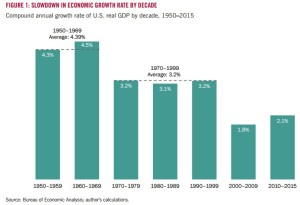
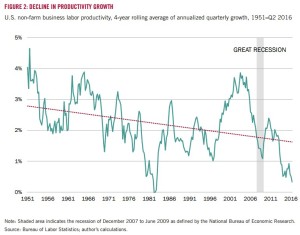
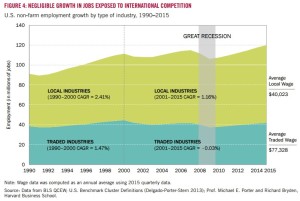
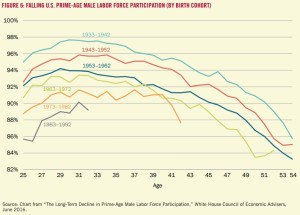
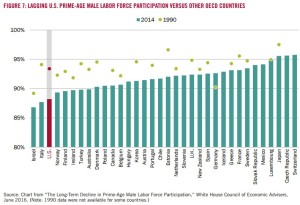
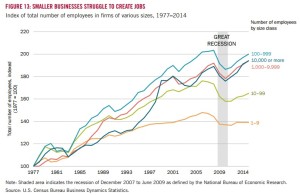
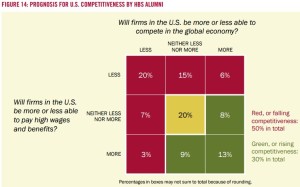
• America’s economic performance peaked in the late 1990s, and erosion in crucial economic indicators such as the rate of economic growth, productivity growth, job growth, and investment began well before the Great Recession.
• Workforce participation, the proportion of Americans in the productive workforce, peaked in 1997. With fewer working-age men and women in the workforce, per-capita income for the U.S. is reduced.
(生産的労働力の労働参加は1997年にピークを迎えた。…)
• Median real household income has declined since 1999, with incomes stagnating across virtually all income levels. Despite a welcome jump in 2015, median household income remains below the peak attained in 1999, 17 years ago. Moreover, stagnating income and limited job prospects have disproportionately affected lower-income and lower-skilled Americans, leading inequality to rise.
(実質家計所得の中央値は1999年以来下落し、事実上全ての所得レベルにおいて停滞し続けている。…)
• A similar divergence of performance has also occurred between large companies and small businesses. While large firms have been able to prosper, small companies are struggling, startups are lagging, and small business is no longer the leading job generator.
(… 大企業は繁盛することができたが、中小企業は苦労し、起業者は沈滞し、スモールビジネスはもはや雇用を産み出す牽引役ではなくなっている。)
• Overall prosperity is growing slowly, but the benefits are increasingly not flowing to middle- and lower-income Americans. This puts the American Dream, or the ability of any American to advance and prosper, at risk.
[Chapter 3] An eroding U.S. business environment
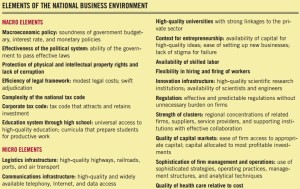
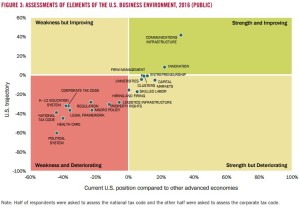
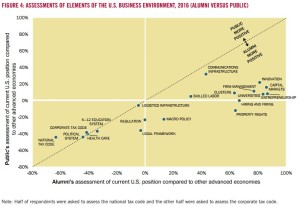
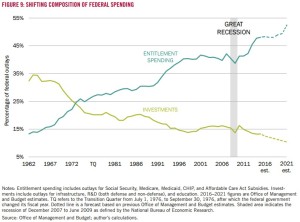
• The U.S. economy retains critical strengths. Business leaders (including HBS students) perceive strengths in areas such as higher education, entrepreneurship, communications infrastructure, innovation, capital markets, strong industry clusters, and sophisticated firm management. However, these strengths are being offset by weaknesses such as the corporate tax code, the K–12 education system, transportation infrastructure, the health care system, and the U.S. political system. Skills have also been eroding and becoming a weakness. Many of the greatest weaknesses are in areas driven by federal policy.
(アメリカ経済は決定的な強みを維持している。… しかし、…弱みに相殺されつつある。スキルも衰え弱みになってきた。多くの最大の弱みは、連邦政府の政策により運営されてきた分野のものである。)
• Alumni working in smaller firms have more negative views of the U.S. business environment than alumni working in larger firms. Members of the general public see the same U.S. competitive weaknesses as HBS alumni but, unlike alumni, perceive far fewer strengths.
• This pattern of strengths and weaknesses helps explain why the U.S. economy is no longer delivering shared prosperity. Large companies, the skilled individuals who run them, and those who invest in them benefit from America’s greatest strengths and are prospering. However, workers and small businesses are captives of the nation’s major weaknesses.
• Pessimism about the trajectory of U.S. competitiveness deepened in 2016, for the first time since we started surveying alumni in 2011. Fifty percent of the business leaders surveyed expect U.S. competitiveness to decline in the coming three years, while 30% foresee improvement and 20% see no change.
• Business leaders and the general public are particularly concerned about the future of American workers: respondents who expect lower pay and fewer employment opportunities for the average American in the future far outnumber those who expect improving worker outcomes.
• Inadequate investment in those parts of the business environment on which middle-class Americans depend (areas like K–12 education and skills), together with lack of policy improvement in areas on which small businesses depend (tax policy, regulations, infrastructure), have undermined overall productivity and shared prosperity.
[Chapter 4] The pressing need for a national economic strategy
• Given the significant challenges facing the American economy, the U.S. needs a national economic strategy more than at any other time in recent history. A strategy is an integrated set of priorities that builds on strengths while acknowledging and tackling weaknesses. It identifies the sequence of steps needed to best move ahead.
• The U.S. lacks an economic strategy, especially at the federal level. The implicit strategy has been to trust the Federal Reserve to solve our problems through monetary policy.
(アメリカには、経済政策、とりわけ連邦レベルのものが欠けている。暗示されている戦略は、連銀が金融政策によって問題を解決してくれるのを信頼することであった。)
• A national economic strategy for the U.S. will require action by business, state and local governments, and the federal government. All three levels have a crucial role to play in restoring competitiveness.
• Taking leadership in improving U.S. competitiveness is a pressing imperative for business leaders. Many companies have failed to invest enough in improving the business environments in the regions in which they operate. Companies can have a major impact on restoring U.S. competitiveness through internal steps such as training and improving opportunities and compensation for lower-income employees. Companies must also step up their role to enhance the business environment in their communities by investing in workforce skills, supporting public education, restoring a local supplier base, and participating in collaborative economic development programs in their regions. We find growing evidence that company attitudes toward investing in competitiveness are improving and this is a welcome development. There are more and more innovative programs underway by business in skills, education, and other areas critical to competitiveness.
(アメリカの競争力を回復させるのにリーダーシップを発揮することは、ビジネスリーダーにとって緊近の責務である。多くの会社は、自分達の事業分野におけるビジネス環境への投資を十分にできていない。会社は、低所得従業員への訓練や機会・手当の改善のような社内対策を通してアメリカの競争力を回復させるのに大きな影響力を持つことができる。…)
• State and local governments must also play a crucial role in improving the business environment, because many of the crucial drivers of competitiveness are local. States and cities need a clear strategy for competitiveness rather than isolated initiatives, and government leaders should foster cross-sector collaborations among local business leaders and other community stakeholders.
(競争力の決定的な推進者の多くは地域に根差しているので、州と市等政府もビジネス環境を改善するのに決定的な役割を担わなければならない。…)
• At the state and local level, the Project has found many examples of innovative steps to enhance competitiveness. Mayors, governors, nonprofit leaders, educators, and businesses are working together in new ways to build workforce skills, invigorate the local education system, upgrade infrastructure, improve the entrepreneurial ecosystem, and develop regional economic strategies. Cities and states across America are moving forward toward competitiveness, but more can be done and best practices need to be shared.
(… 市長、知事、非営利団体リーダー、教育者、ビジネスは、労働力のスキルを創り上げ、地域の教育システムを活気付け、起業的なエコシステムを改善し地方の経済戦略を策定する新しい手法において協働している。…)
[Chapter 5] An economic strategy for Washington
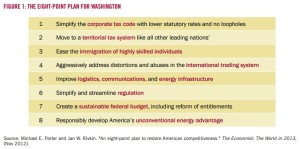
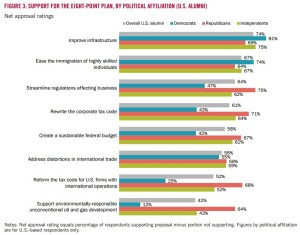
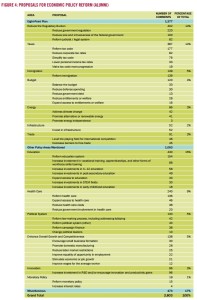
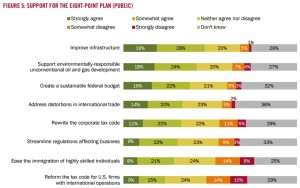
• Efforts by business and state and local government to restore competitiveness cannot deliver their full promise if the federal government does not act. Many of the major weaknesses facing the U.S. are in areas controlled by the federal government.
• In 2012, we put forward an Eight-Point Plan of federal policy priorities that would unlock U.S. economic growth and competitiveness. The Eight-Point Plan consists of the following policy recommendations: simplify the corporate tax code with lower statutory rates and no loopholes; move to a territorial tax system like all other leading nations’; ease the immigration of highly-skilled individuals; aggressively address distortions and abuses in the international trading system; improve logistics, communications, and energy infrastructure; simplify and streamline regulation; create a sustainable federal budget, including reform of entitlements; and responsibly develop America’s unconventional energy advantage.
(アメリカの経済成長や競争力の停滞を解き放つ連邦レベルの重点政策であるエイトポイント・プランを、我々は2012年に策定した。税率を下げ抜け穴もなくす法人税法の簡素化、他の主要国同様の源泉地国課税への移行、高度移住者の移入手続の簡素化、国際貿易における歪みや濫用への積極的な対処、物流・通信・エネルギーのインフラ拡充、規制の簡易化・合理化、福祉改革を含む持続可能な連邦政府予算の作成、アメリカのこれまでにないエネルギー優位を責任を持って創り出すこと、を提言している。)
• Each of these areas represents compelling U.S. weaknesses, primarily controlled by the federal government, that can have the most significant and near-term impact on the U.S. economy. There is also wide consensus on the policy change needed to make progress in each area. There are two other crucial U.S. weaknesses, public education and health care, but these are in fields controlled heavily at the state and local levels with no clear consensus yet on solutions.
(それぞれの分野は、アメリカの反論できないほどの弱みを表している。その弱みは、主に連邦政府に権限が握られているものであって、アメリカ経済にとって最も重要かつ近々に影響のあるものであった。また、各分野において進展させるための政策変更をしても構わないというコンセンサスがある。他に二つ、アメリカの決定的な弱みがあり、公共教育とヘルスケアである。しかし、これらは州と市等に大半の権限があるものであり、対処に係る明確なコンセンサスは無い。)
• Progress on even some of these eight priorities would transform the trajectory of the U.S. economy and the economic prospects of all Americans.
• A strong majority of HBS alumni and HBS students support all eight priorities, with consensus across all political affiliations. When asked in open-ended questions about which priorities alumni felt were most important for federal economic policy, alumni identify virtually the same priorities as those in the Eight-Point Plan. Alumni also mention education, health care, and the political system.
• In the general public survey, there was net positive support for seven of the eight priorities, with a tie on territorial taxes. Public support tended to be somewhat weaker, reflecting the fact that many in the public could neither agree nor disagree, or did not know, whether the eight priorities were good or bad for the economy. Divisive political rhetoric and an uninformed national debate have confused the average American about what the country needs to do to restore the economy. This confusion is a serious obstacle to America’s ability to make progress.
• Despite strong bipartisan support in business and net public support for the Eight-Point Plan, Washington has made very little or no progress on any of these federal economic priorities for well over a decade. The current presidential election is showing no signs of advancing a coherent plan to address these areas.
[Chapter 6] Achieving tax reform
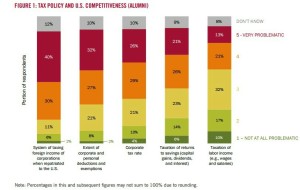
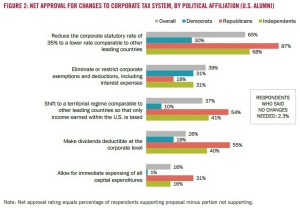
• We believe tax reform is the single area with the greatest potential for immediate impact on the economy and is long overdue given changes in the global economy. Corporate tax policy has become a key obstacle to U.S. competitiveness and economic growth, and reforming both corporate and personal taxation is essential to achieving a sustainable federal budget.
(税制が直ちに経済に最大の可能性をもたらす唯一の分野である、世界経済の変化の下で長年の懸案である、と我々は信じている。法人税政策は、アメリカの競争力及び経済成長に対する主な障害となっている。法人税制及び個人税制の改革は、持続的な連邦政府予算の実現にとって必須である。)
• Good tax policy should be guided by the goals of increasing economic efficiency, achieving greater equity, and reducing complexity. The forces of globalization have amplified the inefficiencies and complexities of the current tax system and demand that reform make the U.S. less of an outlier in key tax policy areas – particularly corporate tax policy. Efforts to reduce the negative effects of globalization should be focused on improving competitiveness, for instance, by upgrading the skills of workers threatened by offshoring, rather than on ill-targeted tax policies.
• The top corporate tax problems, according to the surveyed business leaders, are the high corporate tax rate and the taxation of international income. Business leaders report overwhelming and bipartisan support (over 95%) for corporate tax reform. Consensus corporate tax reforms include reducing the statutory rate by at least 10 percentage points, moving to a territorial tax regime, and limiting the tax-free treatment of pass-through entities for business income. The transition to a territorial regime should be complete, not half-hearted via the inclusion of an alternative minimum tax on foreign income. The feasibility of corporate tax reform is promising given the broad consensus on the nature of the problem and the required direction for reform.
(ビジネスリーダーへの調査結果によると、法人税制の一番の問題は、税率の高さと、国際的収入への課税である。法人税制改革には、圧倒的多数かつ超党派で(95%超)の支持が集まっている。法定税率を少なくとも10%下げること、源泉地国課税へと移行すること、パス・スルー法人の事業収入への免税措置を限定すること、などである。…)
• Comprehensive reform of personal taxes will be more challenging. There is less support for many types of personal tax reform. However, there is broad support for instituting a minimum tax on incomes above $1,000,000. Increasing the tax rate on savings; eliminating the deductibility of charitable giving, state and local taxes, and mortgage interest; and taxing employer-provided health insurance did not receive majority support. Respondents support limitations on deductions and exemptions in general but react strongly against them when specific examples are provided.
(個人税制の包括的改革は、もっと困難であろう。多種ある個人税制の改革には、法人税制へほどは支持が無い。しかし、100万ドル以上の所得には最低限の税を課すことには幅広い支持がある。預貯金への税率を上げること、慈善事業への寄付や州市等税さらには抵当金利への税控除を削減すること、雇用主による健康保険へ課税すること、は多数の支持を得なかった。回答者は、税控除や免除を制限することには総論賛成であったが、各論には強い反応があった。)
• Carbon, not consumption, taxes are the best step forward. Carbon taxes are remarkably popular both as a separate revenue raiser and as part of a structural, revenue-neutral reform. In contrast, consumption taxes are quite unpopular and elicit the most spirited commentary, positive and negative, from our alumni. Several recently-proposed new ideas also receive support, including taxing non-C corporation business income, raising the cap on income subject to the payroll tax, and allowing for the deductibility of dividends at the corporate level.
• HBS alumni also strongly support spending reductions as a means to fiscal stability. Nearly one-third chose not only reduced spending, but also reduced taxation. MBA students are much more accepting of tax increases and less supportive of spending cuts.
• To achieve the right kinds of tax reform, leaders must begin to speak more realistically about the fiscal realities America faces. In addition, simplistic, polarizing, and protectionist rhetoric must be avoided. The time for tax reform is long overdue.
• Tax reform can also contribute directly to shared prosperity. The earned income tax credit (EITC) is probably the single most important innovation on the personal tax side over the last two decades. Simplification and expansion of the EITC is a promising direction for reform.
[Chapter 7] A failing political system
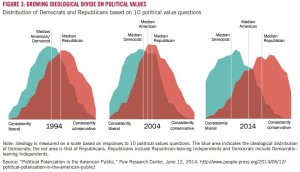
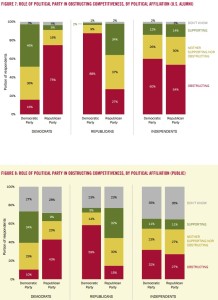
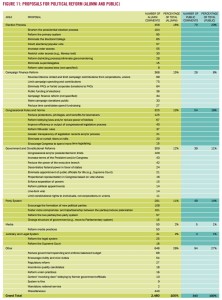
• The U.S. political system was once the envy of many nations. Over the last two decades, however, it has become our greatest liability. Americans no longer trust their political leaders, and political polarization has increased dramatically. Americans are increasingly frustrated with the U.S. political system. Independents now account for 42% of Americans, a greater percentage than that of either major party.
(アメリカの政治システムは、以前は多くの国からの羨望の的だった。しかし、過去二十年以上、アメリカ最大の負の財産となった。アメリカ人はもはや自分達の政治リーダーを信じず、政治の二極化は劇的に増大した。…)
• The political system is no longer delivering good results for the average American. Numerous indicators point to failure to compromise and deliver practical solutions to the nation’s problems. Political polarization has especially made it harder to build consensus on sensible economic policies that address key U.S. weaknesses. It is at the root of our inability to progress on the consensus Eight-Point Plan.
(政治システムは、もはや普通のアメリカ人には良い結果をもたらさない。無数の指標が示すとおり、妥協の失敗、国の問題への実際的な解決策を提供できていない失敗、がある。政治の二極化は、アメリカの主要な弱みに取り組む賢明な経済政策に係るコンセンサスを形成するのを特に難しくしている。…)
• A large majority of HBS alumni believe the political system is obstructing U.S. economic growth and competitiveness. Many alumni who self-identified as Democrat or Republican blame the other party, but a sizable proportion also hold their own party responsible.
(…政治システムがアメリカの経済成長や競争力を妨害している。…民主党員か共和党員かを自己表明していると他党を責めるが、大きな割合の者達が自党に責任があるとも考えている。)
• Among the general public, many believe that the political system is obstructing economic progress. However, many Americans are unsure, which we attribute to the divisive and partisan dialog on the economy which has confused the public on many issues.
• There is strong support for political reform among surveyed alumni. Of six common proposals for political system reform, a strong majority of HBS alumni support five. The most supported reforms are gerrymandering reform and campaign finance reform.
• Among the general public, the top two political reforms supported are term limits for the House and Senate and campaign finance reform. However, a large percentage of the general public are unsure about which reforms they favor.
• Overall, we believe that dysfunction in America’s political system is now the single most important challenge to U.S. economic progress. Many Americans are keenly aware that the system is broken, but are unsure why it is broken or how to fix it. While there is rising frustration with politics, there is, as yet, no framework for understanding the reasons for today’s poor performance and proposing effective solutions. Identifying such a framework, and the set of reforms that can change the trajectory of our political system, has become a crucial priority.
(… 政治システムが壊れている、と多くのアメリカ人が痛切に感じているが、何故壊れているかどうやって直せるかは分かっていない。政治への不満は高まっているが、今日の貧弱な成果の理由を理解し効果的な解決策を提案する仕組みは無い。…)
All the below links are in English. Excerpts are on our own.
標記討論会(於:@longwoodu)及び各種政策等に関する米加英豪シンクタンク等による記事の一部のリンク・抜粋を取り急ぎ以下貼っておきます。(本投稿一番下に私見を書きました。)
US Presidential Election 2016 Vol.2 (Who won the vice presidential debate? | @CNNPolitics)
2016 VICE PRESIDENTIAL DEBATE: WHY THESE TWO KEY QUOTES ARE SO IMPORTANT | JUSTIN BUCHLER @CWRU_Polisci @KyleKopko @Newsweek
… Pence, unlike Trump, has always been a conservative hardliner, particularly on issues like abortion. The challenge that this creates is that most voters don’t share his views. Consider the following data from the 2012 American National Election Studies survey. While 45.7 percent of respondents said that women should always be able to attain an abortion as a matter of personal choice, only 11.5 percent said that abortion should never be permitted. …
… Political conflicts can be defined by “lines of cleavage,” Schattschneider wrote. If you want to win, draw the line of cleavage in a place that is beneficial to you, by placing as many people as possible on your side. If you oppose abortion for rape victims (as Pence does), don’t talk about it. …
POLL: Who Won the Vice-Presidential Debate? | @Olivia_Stacey @HeavySan
Mike Pence falls short…of an impossible task | @JohnJHudak
What Pence needed to do
What Tim Kaine needed to do
Don’t blame Mike Pence
Why tonight doesn’t matter
Why tonight’s debate might matter
6 things Trump definitely said that Pence claimed he didn’t | @henrycjjackson @politico
Mike Pence Defends Refugee Plan Blocked by Judges | @m_rhodan @TIME
VP Debate: Coming Out of the Shadows | William Harbour @longwoodu @HuffPostBlog
Insiders: Trump will sink Pence in VP debate | @POLITICO_Steve @politico
– ‘Is it just me or are the two VP candidates infinitely more appealing than their running mates?’ said a Pennsylvania Republican.
Vice Presidential Debates Have Mattered Before. Here’s A Look Back | @NPRrelving @nprpolitics
WHY THE VICE-PRESIDENTIAL DEBATE DOES AND DOESN’T MATTER | @JohnCassidy @NewYorker
COMMENTARY: Compare candidates on economy | @DeanBaker13 @cpsj @ceprdc
… This background is important since, in most areas, Clinton would continue and extend policies put in place by Obama, while Trump would reverse them. Starting with taxes, Obama restored the Bill Clinton-era tax rates on high income people. Hillary Clinton has proposed modest further increases in tax rates on the highest income households.
By contrast, Trump has proposed large tax cuts that would disproportionately benefit the richest people in the country. He would go back to the Bush-era tax rates on the very wealthy. This would reduce the taxes on the richest 1 percent by an average of more than $120,000 a year and the richest 0.1 percent by more than $700,000 a year.
He would also eliminate the estate tax, a tax that affects less than 0.2 percent of estates. In addition, he would cut the top corporate income tax rate from 35 percent to 15 percent. Trump’s tax cuts are projected to add $4 trillion to the debt over the next decade.
Clinton wants to keep and extend the Affordable Care Act. She has indicated she wants to make the subsidies in the health care exchanges more generous and give people the option of joining a Medicare-type public plan. She also wants to reduce the cost of prescription drugs by allowing imported drugs and also for Medicare to negotiate lower drug prices.
Trump has said he wants to repeal the ACA as one of his first acts as president. He says that he will replace it, but has not given any specifics.
Trump has also made a big point of saying that he wants to increase U.S. oil, coal and gas production by reducing regulation. It is worth noting that domestic oil and gas production both increased by more than 20 percent under Obama. Coal production is down, but largely because it can’t compete with cheaper alternatives.
Trump has also been eager to claim that he doesn’t believe in global warming and will do nothing to stop it. Clinton accepts the scientific consensus that global warming is a serious threat and will attempt to curb greenhouse gas emissions.
Trump has also complained that the Federal Reserve Board is keeping interest rates too low, implying that he would appoint people who would raise rates and slow the economy. Clinton would presumably appoint people who are more committed to supporting growth and job creation. …
Hillary Clinton, Donald Trump and the Economy | @DeanBaker13 @InsideSourcesDC
History is clear—high tariffs and trade wars devastate countries | Fred McMahon @FraserInstitute
Climate Change Can’t Get Traction In This Election, But Clean Energy Can | @JeffMcMahon_Chi @forbes
Compare the Candidates | @CFR_org
– See where the next Commander-in-Chief wants to steer the United States on the most pressing foreign policy issues.
– Who Are the Vice Presidential Candidates?
Clinton and Trump: Commanders-in-Half | Gary Schmitt & James Cunningham @AEI @RealClearNews
Donald Trump’s sycophant problem | @DLind @voxdotcom
– Presidents need to hear bad news. Donald Trump can’t handle it.
The US election is dangerous for Australia | Paul Dibb @ANU_SDSC @ASPI_org
Simplifiers v. complicators | @nfergus @BostonGlobe
私見:リンク一番上の@CNNPoliticsの@David_Gergen教授の下線部分〔概要:有権者は討論の細かい内容を調べるということはほとんどせず、その替わりに討論全体のトーンや候補者の出来の雰囲気を見て判断をする。ペンス氏の発言は必ずしも事実に相違しないこともないが、彼の落ち着きやすっきりした感じは有権者にウケた。良かれ悪しかれ、この種の討論会ではこういうスタイルが重要である。〕が、本討論会の時間帯には良く当てはまると感じました。どのような場合でも記事によっては、後で尾鰭が付き過ぎて実際とかけ離れている、党派性等が非常に濃い、更には、全然理解ないまま書かれている、などが有り得ます。今年の大統領選挙は現時点ではまだどちらに転ぶか分からない、従来ほとんど影響力を持たなかった副大統領候補テレビ討論会が今後投票日までに意外な影響を及ぼす可能性もある、と感じています。
All the below links are in English. Excerpts are on our own.
1960年(参考:1st Kennedy-Nixon debate (YouTube))や1980年には選挙の帰趨を決したとも言われるのが、 Presidential Debate です。標記第1回(於:@HofstraU)の内容に関する記事の抜粋等を取り急ぎ以下貼っておきます。
Trump And Clinton Sounded As If They Were Talking About Two Different Countries | @bencasselman @fivethirtyeight
Trade
… U.S. manufacturing employment has been hit by automation as much as by globalization, and most economists think trade with China has had a much bigger impact on the economy than NAFTA. …
… But in recent years, research has found that the negative effects of trade — lost jobs, lower wages — last longer than previously believed. Economists once thought that Rust Belt communities, or at least their residents, would rebound quickly from the loss of factory jobs; that hasn’t happened. …
Taxes
… On Monday, however, Trump largely abandoned his populist rhetoric on taxes and instead embraced more traditional Republican talking points: Cutting taxes, including on the rich, he argued, will lead them to invest more in companies and create jobs, while lowering and restructuring corporate taxes will encourage businesses to bring back money stashed overseas. Many economists agree that, all else equal, lowering taxes will tend to boost economic growth. But few believe Trump’s plan would deliver as much of an economic boost as he claims. …
Crime and policing
… The candidates offered different policy approaches: Trump called for more aggressive policing, singling out New York’s abandoning of its “stop-and-frisk” policy under Mayor Bill de Blasio. Trump said the controversial policy worked; Clinton said it discriminated against minority residents. (Holt pointed out that the policy had been ruled unconstitutional by a federal judge; Trump said the ruling would have been reversed if it had been appealed.) Clinton instead called for gun restrictions, including universal background checks (which research has suggested could help reduce gun killings) and broader criminal justice reform, including abandoning mandatory-minimum sentences, which she said “have put too many people away for too long, for doing too little.” …
Presidential fireworks: The verdict | David Ribar @MelbInstUOM, @LaurenRosewarne @unimelb, James Cahill @Government_UoM; @electionwatch_, Election Watch USA
POLICY
… It was also a surprisingly effective policy battle – though fought using completely different tactics by the two candidates.
Viewers who wanted policy details got heaps of information from Clinton, who offered a comprehensive list of initiatives to grow the American economy, improve outcomes for the country’s middle class, strengthen policing, heal race relations, address the problems of America’s inner cities, counter cyber vulnerabilities, and fight ISIS.
…
… Trump’s strategy, however, wasn’t to offer policy specifics but rather to discredit Clinton’s and thereby discredit her. In this regard, Trump’s responses were nothing to sniff about – though sniff and sniffle he did. In every segment of the debate Trump emphasised the country’s problems – job losses, rising murder rates, and increasing threats at home and abroad.
Trump followed this litany of woe with effective criticisms of the failure of politicians generally, and of President Barack Obama and Clinton specifically, to address these problems. He repeatedly asked Clinton why she didn’t fix these problems during her long years of service. Trump clearly played to his strengths as an outsider. …
PERCEPTION
For the first couple of moments, Trump’s tone was under control. Clinton’s was shaky, her sentences over-rehearsed. Initially he accomplished a natural, off-the-cuff persona. She was stiff and awkward. …
… He went so far as to pat himself on the back for not saying “something extremely rough to Hillary”, all the while being unable to resist the siren’s call of fat-shaming – apparently the cyber attack on the Democratic National Committee could have been “someone sitting on their bed that weighs 400 pounds,” and, hilariously, the tried and true ‘you-love-it-so-much-why-don’t-you-marry-it’ schoolyard zinger of “the Iran deal that you’re so in love with”. …
POLITICS
… Forced to answer, I’d say Clinton, but this was no knockout. Her performance will likely help her make some progress with her intended audiences – moderate Republicans uncomfortable with Trump and wavering young Democrats. Trump largely stuck to his standard message and it would be unlikely if he won over many voters not already in his camp. …
… Strategically, I don’t think this debate will help Trump move beyond his apparent polling ceiling of roughly 43-44%. The part of the Republican voting coalition that is most resistant to Trump’s candidacy are college-educated, white, married women. Over-reliance on his well-known material and repeatedly interrupting Clinton are not likely to change the minds of many of these voters. …
Damned by Faint Trump | @KoriSchake @ForeignPolicy
– Last night’s debate was nothing to crow about on either side, but Hillary Clinton definitely got the better of her rival.
… But it wasn’t horrible — it had substantive moments — and that’s noteworthy this election cycle. Hillary Clinton lived up to her Saturday Night Live impersonation of shrewdness, came locked and loaded with oppo research on Donald Trump’s taxes, business practices, the name of a woman he demeaned, policy citations … and gave Trump all the rope he demanded to explain himself at length. She did some A+ trolling, chipping his vanity and counting on his inability to restrain himself. It was a successful strategy. Trump landed several solid blows but simply lacked the discipline to drive home the points (for example, on her emails). His insistence on his “temperament” as his best quality was refuted by his performance. …
… I thought she missed the chance to bash Trump about his Russian connections. Her policy recommendations are also pretty weak: declaring we won’t permit states to target our private or government information, and that we have tools we could use and will defend our citizens. She seems innocent of the hostility most tech firms have toward Washington, breezily counting on working with them. …
Trump repeated much nonsense… claiming Iran was “ready to fall” before the nuclear agreement propped the government up, falsely claimed he convinced NATO to start looking at terrorism, weirdly claimed that “all of the things she is talking about could have been taken care of in the past 10 years when she had immense power.”
He revisited his standard complaints about America’s unaffordable alliance relationships, giving Clinton her best moment of the night as she spoke to reassure America’s allies that our country will honor our mutual defense treaties and can be trusted to keep its word. It pretty well defanged his claim that “she’s got experience, but it’s bad experience. And this country can’t afford to have another four years of that kind of experience.” …
Trump, Clinton debate fact-checks (a running collection) | @YLindaQiu @PolitiFact
Here are 33 claims from Clinton and Trump, fact-checked. …(17 claims as below)
Clinton: Trump’s tax plan would deliver “the biggest tax cuts for the top percent of the people in this country.”
Clinton: “He started his business with $14 million, borrowed from his father.”
Trump: “My father gave me a very small loan in 1975, and I built it into a company that’s worth many, many billions of dollars, with some of the greatest assets in the world.”
Clinton: “In fact, Donald was one of the people who rooted for the housing crisis. He said, back in 2006, ‘Gee, I hope it does collapse, because then I can go in and buy some and make some money.’ Well, it did collapse.”
Clinton: “Independent experts have looked at what I’ve proposed and looked at what Donald’s proposed, and basically they’ve said this, that if his tax plan, which would blow up the debt by over $5 trillion.”
Trump: The Obama administration “has doubled” the national debt in eight years.
Trump: “You go to New England, you go to Ohio, Pennsylvania, you go anywhere you want, Secretary Clinton, and you will see devastation where manufacturing is down 30, 40, sometimes 50 percent.”
Trump: “Now, look, we have the worst revival of an economy since the Great Depression.”
Trump: “You will learn more about Donald Trump by going down to the Federal Election Commission” to see the financial disclosure form than by looking at tax returns.
Clinton: “You’ve taken business bankruptcy six times.”
Clinton: “You even at one time suggested that you would try to negotiate down the national debt of the United States.”
Trump: “In Chicago, they’ve had thousands of shootings, thousands since January 1st. Thousands of shootings.”
Clinton: “Donald started his career back in 1973 being sued by the Justice Department for racial discrimination because he would not rent apartments in one of his developments to African-Americans.”
Trump: “I settled that lawsuit with no admission of guilt.”
Clinton: “I was so shocked when Donald publicly invited Putin to hack into Americans. That is just unacceptable.”
Clinton: “He actually advocated for the actions we took in Libya and urged that Gadhafi be taken out, after actually doing some business with him one time.”
Clinton: “John Kerry and President Obama got a deal that put a lid on Iran’s nuclear program without firing a single shot.”
Clinton Prevails in Downer of a Debate | @amyewalter @CookPolitical
Many Young Voters Remain On The Fence After First Debate (w radio) | @asmamk @NPR
Poll: Clinton Leads Trump Ahead of First Debate | @mmurraypolitics(9/21)
Debating the debates | @cpazzanese @Harvard Gazette(9/22)
– Harvard analysts ponder the upcoming presidential clashes, how viewers may react, and how the candidates might snare their votes
Polls: Clinton Running the Table in Key Battlegrounds | @mmurraypolitics(8/12)
New September Electoral College Ratings | @amyewalter @CookPolitical(9/23)
The Race Tightens But the Math Heavily Favors Clinton | @CharlieCookDC @CookPolitical(9/20)